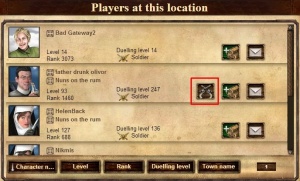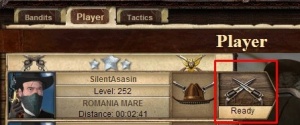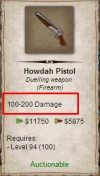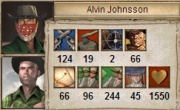Duels
Duels
There are two types of duels. NPC Duels and duels against other players (from now on they will just be called Duels).
General information
A duel is a fight between 2 players. In order to have a successful duel, both the challenger and the defender have to fulfill a specific set of requirements. The defending player does not have to be online for you to challenge him.
A duel lasts 10 minutes and takes place at the defender’s location; this means the challenger has to travel there first. If the defender moves to a different spot after the duel is initiated, the location of the duel won’t change. Note that a dueller class character can attack within a radius of 15 minutes without travelling there (or 30 minutes if he has enabled his Character Bonus). Each class’ duelling advantages can be found here.
Duels ordinarily cost 12 energy points for the challenger. The defender does not lose any energy. The energy cost is independent of the outcome of the duel, meaning whether you win or lose, energy points will be deducted from your character. You can cancel the duel before the 10 minute counter reaches 0 and the other player will not get any notification.
Note: you will not lose energy points for cancelling a duel early. You also won’t lose energy points if your opponent goes to sleep or levels up out of your duelling range, leaves town or gets knocked out before your attack occurs. (also known as a “failed duel”).
Challenging a player
A duel can be initiated in four ways:
| By clicking the Challenge to a duel button in the player's profile. | |
| By clicking the player's location on the map and clicking the Duel button next to the player’s name. | |
| By clicking the Duel link next to the player's name in his town's saloon. | |
| By clicking on the Duel menu at the bottom of the page, going to the Players tab and clicking on the Duel button next to the name. More information on how to use the Players tab can be found here. |
Duelling requirements
In order for a duel to be initiated, all the following requirements must be met:
- The challenger has to be member of a town. This town also needs a Mortician.
- The defender has to be member of a town.
- The challenger and the defender cannot be members of the same town.
- The challenger has to visit the location of the defender.
- The challenger needs at least 12 energy points or, if under duel protection due to expire in under 48 hours, at least 1 energy point.
- Both players have to be able to gain experience points from winning the duel.
- You cannot challenge the same player more than once per hour.
- A player, challenger or defender, cannot be challenged to a duel within 72 hours of being knocked out. However, the player may cancel their 72 hour duel protection by initiating a duel 24 hours after being knocked out.
- The defender cannot be sleeping in a hotel or in barracks unless they have initiated a duel within the previous 45 minutes and the duel finishes before the 45 minutes period ends.
- The defender cannot be at a fort battle location and signed up for it unless they have initiated a duel within the previous 45 minutes and the duel finishes before the 45 minutes period ends.
The Duel
A duel is separated into 8 rounds. Each player has 8 chances to try to land a hit and 8 changes to dodge the attack from the other player. To land a hit you need a high attack value. To evade a hit you need a high defend value.
Attack Value
The attack value is decided by your aiming skill. The more points you have in your aiming skill, the higher is your chance to hit your opponent. An extra bonus to your aiming skills to comes through the comparison of the skills Tactics and Appearance.
With the Tactics skill, the defender is able to use his home advantage. He chooses the side on which he stands and uses the knowledge of the town. The challenger on the other hand uses his Appearance skill to intimidate the defender. If the tactic skill of the defender is higher than the appearance skill of the challenger, the defender gets a bonus on the Aim skill. If the tactic skill of the defender is lower than the appearance skill of the challenger, the challenger gets a bonus on the Aim skill. The bigger the difference between the skills, the more the aim bonus is given.
Additionally each player receives a bonus of +5 for the attack value, making it possible for them to land a hit when the right conditions are being met.
There are buffs available and can be crafted that can boost the aim, tactics or appearance skill points and therefore boost someone’s attack value.
Dodging Value
The defence value is calculated from your dodging skill.
If the defender dodges to cover the body part that the attacker was aiming at, the dodging skill of the defender gets a significant increase while the attacker’s aiming remains the same. See also duelling tactics.
Additionally each player receives a bonus of +5 for the defence value, making it possible for them to evade a hit when the right conditions are being met.
There are buffs available and can be crafted and that can boost the dodging skill points of a defender.
Damage exchange
The challenger is the first one to attack in each round, followed by the defender. Both fighters have eight chances to land a hit and cause damage, unless one of the two participants’ life hits 0 before the next round starts.
With each shot the attack value of the attacker is compared to the defence value of the defender. For this, a random value is taken between 1 and the attack value, and a random value between 1 and the defence value. If the attack value is higher, the attacker lands a hit and causes damage. If the value is lower, the shot doesn't hit its target and no damage is done. After this it’s time for the current defender to attack.
Damage
Damage is caused when one player lands a hit on another player and it is calculated in health points. The amount of damage taken is decided by four factors:
- The attacker’s weapon
- The amount of damage skills
- The striking zone
- The defender’s resistance skills
- The use of duelling buffs
The Weapon
There are two different duelling weapon classes. Melee weapons and ranged weapons. You can find a list of all the available weapons here.
Each weapon, whether it is a melee or a ranged one, has a specific damage range. This range can be found in the weapon’s statistics. Every time a player lands a hit, a number within the weapon's damage range is randomly picked.
The damage skills
The damage that is done by a melee weapon is increased with good vigor skills. For the ranged weapons the damage is increased with good shooting skills. The damage each weapon is able to do is varies from 25% (minimum) up to 175% (maximum) of it. Under no circumstances can this amount get lower than the minimum damage or higher than the maximum one.
The striking zone
A striking zone is the location where the attacker lands the hit. As it has already been stated in the duelling tactics, this can be selected in the Tactic tab in the Duels menu.
 |
An arm hit gives you 100% damage. |
 |
A shoulder hit gives you 115% damage, meaning 15% more. |
| A headshot gives you 150%, meaning 50% more. |
Resistance
In general, resistance is the ability of the defender to lower the damage taken per hit. This can be achieved by investing attribute and skill points in the resistance ones. The general rule is that good toughness skills lower the damage done by melee weapons whereas good reflex skills are effective against ranged ones. The more resistance a defender has, the less damage he will take per hit. The more points the attacker has in the damage skills (vigor/shooting according to the weapon), the more damage will be inflicted (also known as “break through the resistance” ).
Going into details though, there’s a distinction between primary and secondary resistance. This means that for both melee and ranged opponents, both resistance skills do matter up to an extent.
- Against ranged duelers: Primary resistance: Reflex, Secondary resistance: Toughness
- Against melee duelers: Primary resistance: Toughness, Secondary resistance: Reflex
The Total Resistance calculation formula is:
Total Resistance: 1 * Primary resistance + y * Secondary resistance
Where "y" is an number not disclosed by the developers of the game. It was however hinted that this value is between 0.25 and 0.5.
The difference between the damage skills and the total resistance defines how much damage the weapon can inflict on the opponent. If that difference is a positive number (>0), the attacker will inflict between 100% and 175% damage. If that difference is a negative number (<0), the attacker’s damage will range from 25% up to 100%.
Duelling buffs
There are buffs that increase the damage a weapon deals by either boosting skills like vigor and shooting or by adding damage to the equipped weapon. Accordingly, there are buffs that can increase the resistance skills. For more information regarding buffs, check the crafting page.
| To summarise everything that was mentioned regarding damage and to provide a simple damage calculation example, the maximum damage a Howdah pistol (100-200 damage range) the can inflict against a non-resistant opponent (x1.75 multiplier) while aiming the head (x1.50 multiplier) and using a polishing stone (30-50 damage increase) is as follows: |
Duelling tactics
Whilst a duel has not been scheduled, players can select where they will aim and dodge by clicking on the Duel menu at the bottom of the page and then clicking on the Tactics tab. By setting the striking and dodging zones they can also alter the damage and the dodging chances (see also dodging value).
As it has already been stated, depending on the area the attacker hits, different amounts of damage are being taken. A shoulder hit makes 15% more damage whereas a headshot gives 50% more damage. Always keep in mind though that the higher you aim the lower your chance to land the hit.
There are four options for dodging.
| Duck down and by that protect the head and both shoulders. | |
| Dodge to the left and protect the head, the right shoulder and the right arm. | |
| Dodge to the right and protect the head, the left shoulder and the left arm. | |
 |
Stand up and have more concentration for the next round. This doubles your attack value. |
These settings are for rounds 1-4. After that the same pattern repeats, meaning round 1 and 5 have the same aim and dodging stance and so on.
Hint: After basic skills, duelling stance is the second biggest factor in determining the outcome of a duel. Your stance is not shown to your opponents, however frequent duelling can allow a team of enemies to guess your configuration so it is recommended you frequently change your stance to minimise targeting.
Winning a duel
The player that causes the most damage in the duel wins. If both players cause the exact same amount of damage, the defender wins. If a player loses all his health points in the duel, he passes out and cannot duel or be duelled for the next 72 hours or 24 hours if the player chooses to cancel their knockout protection. He loses all his energy and the cash he’s carrying on him, not his banked cash though. The other player is declared the winner even if he caused less damage.
Duel result
The winner of the duel gets two rewards: cash and experience points (character and duelling ones). The loser of the duel also receives some penalties, they lose part of their un-banked cash, duelling experience and health points. If a player is knocked out in a duel, they will lose all of their energy points.
The winner receives 1/3 of the cash the loser was carrying around. If the loser doesn't carry any money, the winner doesn't receive anything. If the defeated player gets knocked out, they loses all the cash in their pocket (not their bank account cash) and the winner still gets 1/3 of it. The dueller class wins an additional 5% more money in a duel (or 10% if they have class bonus premium active).
The winner also receives experience points for the duel. How many points are received depends on the duelling level of the opponent. The loser will lose 1/3rd of the duelling experience they would have gained if they had won the duel.
Duelling Exp = (7 * Loser’s duelling level) - (5 * Winner’s duelling level) + 5
Character Exp = (Duelling Experience * 3) * Exp Bonus from Item Sets
The experience points reward is affected by the duelling motivation of the winner. Note though that the 1 experience points requirement that is needed for a duel to occur is calculated on a 100% motivation basis, even if the challenger’s motivation is as low as 10% at the time the duel is taking place.
Hint: Your duel range can be calculated by the following formula:
Max Duel Level of Opponent = (7 * Your Duelling Level + 4) / 5
Min Duel Level of Opponent = (5 * Your Duelling Level + 4) / 7
Duelling level
The duelling level of a player is calculated from his character level and the experience points the player has earned and lost in duels. The more points were received, the higher the duelling level. As of the 2.17 update aimed at reducing zero motivation duelling, the following rules apply in the calculation of a player's duelling level;
- Duelling levels will be capped at four hundred and fifty
- Losing a duel will deduct a third of the duel experience you would have gained for winning
- Active characters with no duel initiated in the past forty five days will lose 1% of their current duel experience each week
- Duel motivation will never fall below 10% (Was originally set to 1% in 2.17 update but was subsequently raised)
Motivation
There are two types of duel motivation. NPC motivation and Player versus Player motivation (PvP) .
NPC motivation
More information regarding NPC motivation can be found here.
PvP motivation
The lower this motivation is the less experience the winner he gets. Only the challenger loses motivation, whether he wins or loses.
With each duel the motivation goes down by 3 points. A lower motivation means that less experience points are received. For example, with a motivation of 50% the winner only receives half of the calculated points. With a motivation of 10%, the minimum, the winner gets only a few experience points. The motivation increases by 10 points per day.
You can check your current motivation either in the Players tab in your Duel menu or by checking a foreign town’s saloon.
Bounties
- You can duel town-less players with a bounty on their head.
- Once the bounty is collected, they can no longer be duelled.
More information regarding bounties can be found here.
Duelling advantages per class
Out of the five character classes that are available in the game, two of them give special advantages for duelling: The Soldier and Dueller class.
Soldier class
- The level needed to use a weapon is lowered by 3 levels.
- In duels you receive a bonus of 50% to your tactic skill.
Dueller class
- The motivation for duelling raises 40% faster than other classes.
- You receive 10% more money in a duel.
- You can perform duels within a radius of 15 minutes without travelling there.
Note that all these advantages are doubled if the player has enabled his Character bonus premium
Players Tab
If you have no specific player that you want to duel, one way of finding opponents is by using the duelling tab.
On the right side of this window you have the option of specifying the distance range within which you are searching. You can choose between 10 minutes up to 6 hours.
On the left side, you have the option of arranging your enemies in three different ways:
 |
By duelling level (ascending or descending), clicking on the two crossed revolvers above the players avatars. |
 |
By distance (closest or furthest away), clicking on the three stars above the names. |
 |
By class, clicking on the two golden crossed guns icon above the classes. |
Clicking on each one of these icons once will sort the opponents from the lowest value to the highest one (or A to Z for the classes). Clicking on it again will sort them from the highest value towards the lowest one (or Z to A for the classes).
Hint: Setting the distance to 6 hours and then assorting your enemies by duelling level (ascending and descending) can give you an idea of your current duelling range. Please note that this method only shows the opponents fulfilling the duelling requirements, therefore if your highest level or lowest level enemies are asleep or knocked out, they won’t show up here.
NPC duels
There are two types of Non-Player Characters Duels. NPC duels from the Duel tab and NPC duels from quests.
NPCs from the "Duel" tab
A player can duel against Non-Player Characters by clicking on the Duel icon at the bottom of your page and then going to the Bandits tab. A list of NPCs is shown on this screen and by mousing over each NPC you can see their duel skills, weapon and health points. You can use the NPC duels to test your current duelling build.
Each NPC duel costs 5 energy points and it lowers your NPC motivation by 2%.For each NPC duel that you win you raise the Duel difficulty level by 1 point. For every NPC duel level that you lose, you lower it by 1 point. The higher the level is, the tougher your opponent is to beat.
When you defeat your NPC opponent, the two crossed revolvers next to the name disappear and the icon fades out. There is also a re-spawning period until the next bandit appears. This can be found under your opponents name and level
The available bandits get renewed every half an hour. At the bottom of the window you can see how much time there is left.
You gain both money and experience points from beating an NPC but also lose a portion of your money if you lose. Note: You do not receive experience towards your duelling level.
Caution: If an NPC from this list passes you out, you do not receive the 24/72-hour safe period but you still lose all your health, energy and on hand cash and wake up in your town's hotel and the duel difficulty level resets to 0. If you are townless, you stay at the same location you were knocked out.
NPCs from quests
Duels against quest givers work the same way as other duels against players. There are however two major differences:
- The quest opponent does not take any money from you, even if you lose the duel.
- You can challenge a quest opponent as often as you want, until you win the duel. There is no waiting time like with challenging other players.
- Sometimes you are asked to win against a NPC, other times you are asked to kill the NPC.
Caution: Even against a quest giver you can pass out and by that lose all of your money and energy. If you are member of a town, you will be teleported back to your town’s hotel. If you are without a town, you will stay at same location.
More information regarding all the quests and the quest givers can be found here.



























